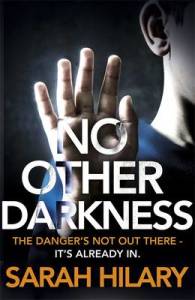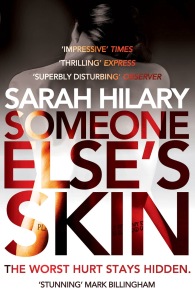No Other Darkness – Sarah Hilary
 With novels as with albums, it is often hard to follow up a successful debut. ‘No Other Darkness’ by Sarah Hilary does so in no uncertain terms, regaling readers with a story as dark and disturbing as ‘Someone Else’s Skin’, rich with psychological insight, edge-of-the-seat plotting and clever criminal detection.
With novels as with albums, it is often hard to follow up a successful debut. ‘No Other Darkness’ by Sarah Hilary does so in no uncertain terms, regaling readers with a story as dark and disturbing as ‘Someone Else’s Skin’, rich with psychological insight, edge-of-the-seat plotting and clever criminal detection.
Arguably, novelists writing a second novel featuring the same leading characters as the first, in the persons of DI Marnie Rome and DS Noah Jake of the London Metropolitan Police, have it a little easier than musicians. They can anchor their story to some of the same elements of the first, without fear of sounding repetitive.
What Hilary does very well though is avoiding the trap of turning her leading characters into stereotypes of the persons they actually are: the former a hard-edged, smart yet compassionate detective, still coming to terms with the sorrow of losing both her parents to a senseless murder, and the latter a somewhat starry-eyed, eager young policeman, juggling the tricky issues of being, as a policeman, young, black and gay.
There is a refreshing let’s-get-on-with-it attitude in both of them, a bravery in refusing to be ground down by self-pity, without actually ignoring their complicated personal circumstances. It is a credit to Hilary how she manages this: treading a fine line in psychological shrewdness when portraying her characters, and not Rome and Jake alone, in letting readers understand, without burdening them with unwanted detail, why they react as they do to the horrific facts they have to deal with.
In a way that is similar to ‘Someone Else’s Skin’- common ground again, but again cleverly handled – the greatest darkness or evil is that which lies in the minds of women and men. Hilary understands this very well, and is adept at letting readers slowly, tantalisingly peel layers off characters and events, each time surprising them with a savage twist, each time giving them a new insight into the depth of such evil.
An evil which is all the more sinister because it touches the weak and the defenceless. In ‘No Other Darkness’ it is children who are the victims: two young brothers, Fred and Archie, not yet ten, who were buried alive in a bunker under a newly built estate in East London and left there to die in solitude and fear, with minimal creature comforts and only a few provisions, that could not be expected to last more than a week or so of the five years they spent down there: unfound, forgotten and dead.
Rome and Jake and their investigative team, as well as the family of Terry Doyle, who accidentally found the boys, with his wife Beth, have to contend not just with a hideous crime but with the seeming impossibility of understanding why. Why do you leave two boys to die in a bunker? Why do you bury them there, providing them with an illusory chance of survival, and then forgetting about them? There is so much to understand, so much to unravel, yet Hilary handles the plot expertly, letting her detectives pursue several avenues of investigation – the construction company that built the estate and could not not know about the bunker, the gypsy travellers who used to live in the neighbourhood before they were forcedly evicted, the Doyle’s neighbour who may be a paedophile, even a rather dislikeable journalist who shares a past with Rome and seems determined to haunt her with it – without the reader getting lost and the pace ever flagging.
And at the same time painting a well-realised picture of a family, the Doyles, whose ‘normal’ veneer cracks ever so slowly at first, gradually leaving disturbing gaps, open questions which Rome and Jake will have to fight very hard to answer.
As she did with her first novel, Hilary does not shy away from laying bare disturbing issues about society and individuals: about foster children (the Doyles have a foster child, a brooding teenager with a complex relationship with Terry Doyle, Beth and their two younger kids), about the construction industry, about victim care. And about how people, us, deal with the darkness that lies inside them, us, and that they, we, often don’t know how to face, or cannot, and should not, face alone.
A heavy burden to bear for a crime novel, but I found that ‘No Other Darkness’ is more than a crime novel, while remaining a very successful one. Hilary knows the boundaries of the genre well, and precisely because of this she can offer readers much more than they would normally expect. Hats off to her authorial generosity and ability, and I look forward to the next instalment in the series.




